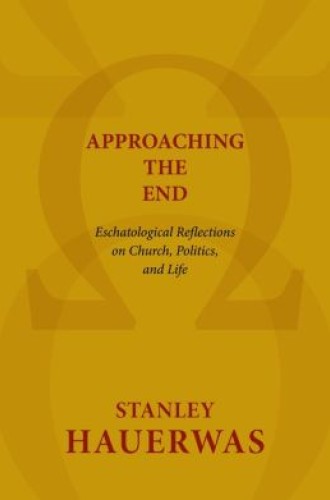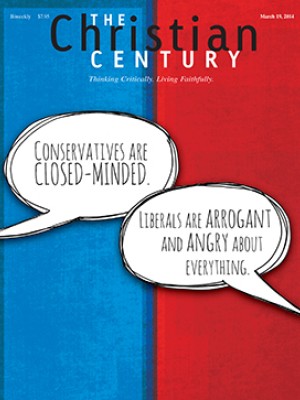Approaching the End, by Stanley Hauerwas
Stanley Hauerwas, who recently retired from Duke Divinity School, identifies himself as first and foremost a teacher. After 45 years of teaching ethics and theology, he considers his major contribution to be helping the church think through the loss of Christendom. I would add that in the process, Hauerwas has made it clear that the church’s loss of power in this new age is a good thing.
Because Hauerwas spends little time bemoaning the church’s decline in membership and loss of legitimacy in the eyes of culture, his writing is refreshing. In an age in which ecclesial leaders are inundated with suggestions on how to repair or reform the church for the 21st century, he seems a little less anxious about the times than most of us. His arguments are not weakened by the “epistemological crisis” the church is going through as it is trapped between irreconcilable means and ends.
Read our latest issue or browse back issues.
Hauerwas’s Approaching the End is neatly divided into three sections: on theological matters, church and politics, and life and death. In keeping with his life’s work, Hauerwas takes on the modern sacrificial state, the privatization and domestication of religion, and the nature of suffering. He also says that his book is about learning how to die and training to be human.
Broadly speaking, it is a book about time and purpose—or, better said, the purpose of time. I would hesitate to suggest that end is a double entendre. Eschatology does not so easily divide telos and time. According to Hauerwas, the church’s eschatological end is to be an alternative politic so the world might recognize itself and a place where Christ’s lordship is operative and visible. He states that our purpose as the body of Christ “is to live lives that point to Christ—lives that are unintelligible if the one they follow is not the Son of God.” Our true end is to inhabit the new vision inaugurated by Christ.
In his essay on habits, inspired by Thomas Aquinas’s locution “wayfarers who are on a journey of the soul to God,” Hauerwas describes our ultimate end as “friendship with God.” Whereas Aristotle identified virtues as a means to the good life and happiness, Hauerwas says that virtues are not ends but the means to “be in service to growth in human friendship with God.”
For Hauerwas, a kerygmatic theologian and self-proclaimed theocrat, friendship with God as an end seems a little casual. In contrast to the “friendly end,” Hauerwas also draws heavily from Karl Barth—who understood that our purpose as covenanted partners is to live in grateful obedience for the gift of life, a gift that is simply on loan and belongs to God. In his essay “Doing Nothing Gallantly,” Hauerwas writes:
For Aristotle, happiness must be complete and self-sufficient and must finally be under our control. For Barth, . . . the joy that makes our lives worth living comes as a gift not under our control. “To be out of control” is what it means to learn to live eschatologically.
Hauerwas emphasizes throughout his essays that the ends of the church are pursued in eschatological time. On the one hand, the Christian life is one of patience and deference to God’s timing; on the other hand, the Christian life will lose its apocalyptic edge if eschatology remains an ideal relegated to the future. In fact, without the ability to see history doxologically, the telos set before us would lead us to despair. We cannot, after all, measure friendship with God or the degree to which our lives are unintelligible. Nonetheless, Hauerwas asserts that time has a plot. He writes, “We believe we come from a past that will find its fulfillment in the future. Time has a narrative logic, which means that time is not just one damn thing after another.”
If all politics are local and church is an alternative politic, it is not surprising that Hauerwas identifies the local church as the hub for authentic transformation. The only way to know God, after all, is for one person to tell another the story. Borrowing from John Howard Yoder, he points to the faith of members of the seemingly insignificant early church. Their declaration of Jesus as Lord could not be evidenced by power, but by their embodiment of cruciform love they served as a witness to the power of Christ’s rule and became effectively a local “politic of persuasion.” Even in his essay on ecumenism, Hauerwas identifies the locus of the visibility of oneness as where Christians live and go to church. While much academic energy is being devoted to new and better strategies to rebuild vibrant institutions, Hauerwas is content to prescribe radical discipleship as the simple, yet difficult, way forward.
Perhaps the most stimulating assertion Hauerwas makes is that Christians are to live in a manner that would be unintelligible if Jesus were not the Son of God. In his own life, Hauerwas has been successful at that in more than one way. His pacifism and embrace of suffering baffle the majority of both Christians and non-Christians who become acquainted with it.
Unfortunately, however, his propensity for intertwining antiquities, present-day philosophy, and theology will likely confound and frustrate sympathetic readers. Ironically, Hauerwas laments the Baconian creation of an invisible realm of science and art that robs laity of a shared conceptual vocabulary. The patient’s inability to communicate with the physician often leads to misdiagnosis. If, as Hauerwas suggests, the local church is the seat of transformation and in need of repair, it seems to me that it would be worthwhile for the teacher to take a dose of his own medicine and “make it plain.”
Nonetheless, the church needs Hauerwas’s prophetic witness. His theology is courageous, challenging, and a source of hope when many ecclesial leaders seem to be despairing. The church needs theologians like Hauerwas, who make bold claims without arrogance and desire to stay in dialogue with their detractors. His attention to suffering, violence, and disability keeps unpleasant subjects at the forefront. This book is for ecclesial leaders who have an appetite for metaconversations on suffering, virtues, and the church as an alternative politic.






